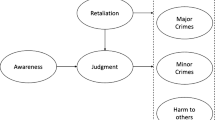Abstract
The present study examined MBA respondents' potential willingness to discuss different unethical practices or behaviors via an employee exit survey. Factor analyses showed that the unethical issues could be categorized into five factors: illegal corporate activities, unfair management actions directed toward employees, illegal human resource activities, small scale dishonesty, and mistreatment of organizational constituencies with varying degrees of willingness to talk about these practices. The respondents' willingness to discuss each of the five factors differed statistically. Discussion centered upon means of using such an ethics exit survey and evaluating the utility of its information.
Similar content being viewed by others
References
Bruce, S. D.: 1998,‘Exit Interview: Potent Management Tool’ Chemical Engineering 95, 105–108.
Campbell, J. P.: 1976,‘Psychometric Theory’ in M. D. Dunnette (ed.), Handbook of Industrial and Organizational Psychology, Rand McNally, Chicago, pp. 185–222.
Drost, D. A., F. P. O'Brien and S. Marsh: 1987,‘Exit Interviews: Master the Possibilities’ Personnel Administrator 32(2), 104–110.
Garretson, P. and K. S. Teel: 1982,‘The Exit Interview: Effective Tool or Meaningless Gesture?’ Personnel 4, 70–77.
Giacalone, R. A.: 1989,‘The Exit Interview: Changing Your Expectations’ Supervision 50(9), 12–13, 26.
Giacalone, R. A.: 1993, A Critical Evaluation of the Army Career Transitions Survey: a Suggested Approach for Reformation (SSP-TCN 93–300), Research Triangle Park, Inc., Battelle.
Giacalone, R. A.: 1997,‘Lessons in Leaving’ Security Management 41(3), 61–65.
Giacalone, R. A. and D. Duhon: 1991,‘Assessing Intended Employee Behavior in Exit Interviews’ Journal of Psychology 125, 83–90.
Giacalone, R. A., T. W. Elig, E. M. Ginexi and A. J. Bright: 1995,‘The Impact of Identifi-cation and Type of Separation on Measures of Satisfaction and Missing Data in the Exit Survey Process’ Military Psychology 7, 235–252.
Giacalone, R. A., S. Fricker and J. W. Beard: 1995,‘The Impact of Ethical Ideology on Modifiers of Ethical Decisions and Suggested Punishment for Ethical Infractions’ Journal of Business Ethics 14, 497–510.
Giacalone, R. A. and S. B. Knouse: 1989,‘Fairwell to the Fruitless Exit Interview’ Personnel 66(9), 60–62.
Giacalone, R. A., S. B. Knouse and D. N. Ashworth: 1991,‘Impression Management and the Exit Interview’ in R. A. Giacalone and P. Rosenfeld P. (eds.), Applied Impression Management, Sage, Newbury Park, CA, pp. 97–110.
Giacalone, R. A., S. B. Knouse and A. Montagliani: 1997,‘Motivation for and Prevention of Honest Responding in Exit Interviews and Surveys’ Journal of Psychology 131, 438–448.
Giacalone, R. A. and P. Rosenfeld: 1989, Impression Management in the Organization, Erlbaum, Hillsdale, NJ.
Giacalone, R. A. and P. Rosenfeld: 1990, Family Separation and Petty Regulations as Dissatisfiers on the Navy Separation Questionnaire (NPRDC TN–90–13), Navy Personnel Research and Development Center, San Diego, CA.
Giacalone, R. A., L. Stuckey and J. W. Beard: 1996,‘Conditions Influencing Biased Responding in Exit Interviews and Surveys’ Organizational Development Journal 14, 27–39.
Hilb, M.: 1978,‘The Standardized Exit Interview’ Personnel Journal 6, 327–329.
Hinrichs, J. R.: 1971,‘Employees Coming and Going’ Personnel 48, 30–35.
Hinrichs, J. R.: 1975,‘Measurement of Reasons for Resignation of Professionals: Questionnaire versus Company and Consultant Exit Interviews’ Journal of Applied Psychology 60, 530–532.
Josephson Institute: 1989,‘An Inventory of Ethical Issues in Business’ Ethics 2(1), 49.
Knouse, S. B., J. W. Beard, H. G. Pollard and R. A. Giacalone: 1996,‘Willingness to Discuss Exit Interview Topics: The Impact of Attitudes toward the Supervisor and Authority’ Journal of Psychology 130, 249–262.
Knouse, S. B. and R. A. Giacalone: 1992,‘Discussion Willingness in the Exit Interview: A Role-Play Investigation’ Canadian Journal of Administrative Science 9, 24–29.
Lee, T. W., S. J. Ashford, J. P. Walsh and R. T. Mowday: 1992,‘Commitment Propensity, Organizational Commitment, and Voluntary Turnover: A Longitudinal Study of Organ-izational Entry Processes’ Journal of Management 18, 15–32.
Lefkowitz, J. and M. L. Katz: 1969,‘Validity of Exit Interviews’ Personnel Psychology 22, 445–455.
Martindale, L. D.: 1988,‘Automating the Analysis of Employee Turnover’ Personnel 65, 19–21.
Phillips, J. J.: 1996,‘How Much is the Training Worth’ Training and Development, 20–24.
Trice, H. M. and J. M. Beyer: 1993, The Cultures of Work Organizations, Prentice Hall, Englewood Cliffs, NJ.
Ulschak, F. L.: 1983, Human Resource Development, Reston Publishing, Reston, VA.
Van de Ven, A. H. and A. L. Delbecq: 1974,‘The Effectiveness of Nominal, Delphi, and Interacting Group Decision Making Processes’ Academy of Management Journal 17, 605–621.
Wehrenberg, S.: 1980,‘The Exit Interview: Why Bother?’ Supervisory Management 5, 20–25.
Woods, R. H. and J. F. Macauley: 1985,‘Exit Interviews’ Cornell Hotel and Restaurant Administration Quarterly 28(3), 39–46.
Zarandona, J. L. and M. A. Camuso: 1985,‘A Study of Exit Interviews: Does the Last Word Count?’ Personnel 62, 47–48.
Author information
Authors and Affiliations
Rights and permissions
About this article
Cite this article
Giacalone, R.A., Knouse, S.B. & Pollard, H.G. Willingness to Report Unethical Behavior in Exit Surveys. Teaching Business Ethics 3, 307–319 (1999). https://doi.org/10.1023/A:1009879913612
Issue Date:
DOI: https://doi.org/10.1023/A:1009879913612




